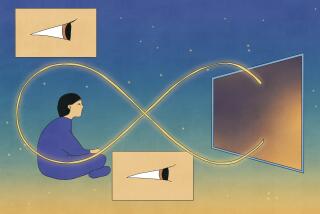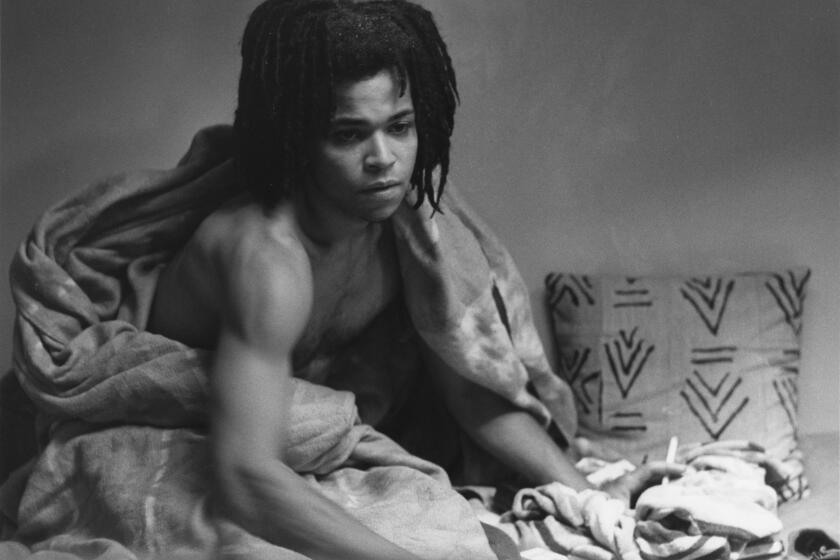From the Archives: ‘Star Trek: Generations’ relies heavily on audience appreciation of the first two TV series
Going boldly where no one has gone before is not what it used to be. Contentedly settled into a prosperous middle age, the “Star Trek” series now seems more comfortable retracing its own footsteps, carefully offering its horde of fans interludes that aspire to do no more than fit snugly into the patterns of the past.
As a result, seeing “Star Trek: Generations,” the seventh and latest Trekker theatrical feature, feels more like engaging in some kind of recurring religious ritual than taking part in the conventional moviegoing experience.
Once again we are back on the deck of the Starship Enterprise, a notoriously unstable place where losing one’s footing is an occupational hazard and life lessons are not hard to come by. “You better take a look at this,” someone is likely to say, and within moments terms like “drive plasma,” “temporal flux” and “low-level ionic pulse” are being tossed around as if they actually meant something.
Not only are the actors soothingly familiar from their previous television appearances, but--except for cinematographer John Alonzo--all the key creative personnel (from director David Carson to writers Ronald D. Moore & Brannon Braga to the producer, production designer, editor, makeup artist, costume designer, hair stylist and composer) also cut their teeth on the small screen versions.
“Generations” seems even more familiar than most because its plot involves two separate starship lineages. Together again for the first time are James T. Kirk (William Shatner), the original series’ 23rd-Century captain, and, fresh from its successor, “Star Trek: The Next Generation,” 24th-Century Capt. Jean-Luc Picard (Patrick Stewart).
Yet a third captain, a wimpy sort named Harriman (Alan Ruck), starts things off in a prologue where he welcomes now-retired old-timers Kirk, Scotty (James Doohan) and Chekov (Walter Koenig) back as celebrity guests on the first Starship Enterprise in 30 years not to have the Big K in charge.
This premiere voyage for the new ship is supposed to be a quiet one, but, wouldn’t you know it, a distress call is picked up from a transport ship caught in a mysterious ribbon of energy. When the dithery Harriman starts to fret and whine, Kirk, noticeably paunchy but still patriarchal, hits him hard but fair with a vintage Trek homily: “Risk is part of the game if you want to sit in that chair.”
That pesky ribbon of energy also comes to engage the “Next Generation” folks, whose antics occupy most of the movie. Aside from Picard, the big screen welcomes both Lt. Cmdr. Geordi La Forge (LeVar Burton), he of the all-seeing visor, and the android Data (Brent Spiner), an artificial life form whose lack of joie de vivre makes him the New Age counterpart of Spock.
In fact, the main subplot of “Generations” concerns what transpires when Data, tired of never getting the joke, inserts an emotion chip into his cranium and discovers humor, sadness and all the other feelings that humans are prey to.
The main story, when it finally reveals itself after a considerable amount of dithering, concerns the machinations of the villainous Dr. Soran (Malcolm McDowell), a 300-year-old El Aurian who likes to say things such as: “Time is the fire in which we burn”--and will do whatever it takes to get back to that ribbon of energy.
The doctor turns out to be so devious that one Enterprise captain is not enough to deal with him. Both Kirk and Picard are mobilized for the task, and it won’t surprise anyone familiar with his Royal Shakespeare Company background that the commanding Stewart makes Shatner look like a graduate of the Klingon Academy of Dramatic Arts.
Still, fans of the series will no doubt be happy to see Kirk again under any circumstances, and if you hunger for the “Star Trek” experience, this will keep you nicely occupied. As for moviegoers not washed in the blood, either a video trip back in time or a look forward to the next installment will be necessary to figure out what the fuss is about. For when someone in “Generations” says, “Somehow I doubt that this will be the last ship to carry the name Enterprise,” you can take it to the bank. Literally.
More to Read
Only good movies
Get the Indie Focus newsletter, Mark Olsen's weekly guide to the world of cinema.
You may occasionally receive promotional content from the Los Angeles Times.











